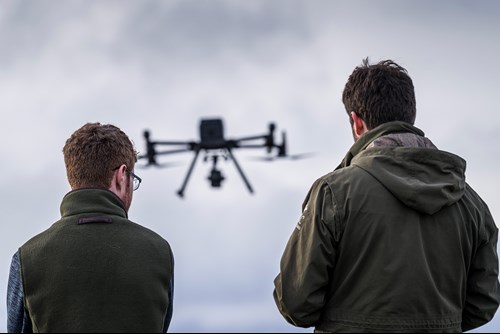Capturing impact and evidence through collecting data on-farms

The web-based carbon calculator tool ‘Agrecalc’ is being moved to a cloud-based platform
At times it feels that the agriculture industry is under more pressure than ever before. Production costs have increased dramatically, while output prices have very rarely followed suit. Pressure to reduce any negative environmental impacts is at an all-time high, and the welfare of our livestock is continually under the microscope.
I strongly believe that the best response to such pressure is to innovate, adapt and evidence the good work we are doing.
As Head of Industry and Partnerships, I have the pleasure of working across SAC Consulting and SRUC, supporting and driving forward the creation of real industry impact from new innovations. I have a front row seat for many of the exciting developments in agri-innovation, but also know all too well that generating real industry impact from using them is not always that easy.
Over the last decade we have seen a growing focus on developments in agri-tech, like electronic tagging, advanced sensors, digital cameras, use of satellite imaging, the wireless transfer of data and on-line data management software. We now have many opportunities to generate new information that can help you better manage your farm, while improving efficiency and reducing environmental impact. However, innovation isn’t, and can’t be, a one size fits all approach - each farm needs to evaluate what works for them.
Currently, our research and consultancy teams are involved in trialling and evaluating a number of tools and approaches, ensuring we are well placed to provide independent and knowledgeable advice for farms.
As the quality of data being collected on farms improves, we are seeing a rise in the use of on-farm information helping to drive innovation. This brings with it the opportunity to reliably quantify the impact of any on-farm improvements that are being adopted.
We are also seeing growing interest in developing more joined-up thinking. Measurements are being taken and stored in such a way that it’s not only useful for its intended primary purpose, but also linked to other data sets that are held on the farm or by other partners. What that means in practice, is that over time there should be more opportunities to gain more value from the information you are collecting. There should also be less need to input data manually, and less need to input the same data twice or even several times.
Obviously, the wish for more joined-up thinking and added value is not new. We already have several examples where it has been a key component of successes that SRUC helped deliver.
Did you know that through our EGENES unit, SRUC runs some of the most advanced genetic evaluations for dairy cattle, beef cattle and sheep in the world. At the core of that service is the analysis of data that has typically been collected primarily for another purpose by farmers or our partners. For example, milk production and quality, fertility and health data for dairy cattle that is recorded and used by milk recording companies; lifespan from traceability records; and Bovine Tuberculosis resistance for cattle from government-led testing programmes.
This year, the EGENES unit is celebrating 20 years of successfully running UK national genetic evaluations, so we’ve learned a lot in that time. It’s important to realise that the majority of our success stories have required careful combing of some enormous data sets. The analysis for dairy currently includes more than 75 million records.
In applying advanced analytics alongside many years of fine-tuning and effective collaborations, we have helped industry achieve substantial impacts. The value to the UK beef and sheep sectors alone is estimated to be more than £20 million a year, with the value to the dairy sector even higher.
Our experience, knowledge and collaborations are now being used to develop new products and services in several other areas, delivering real value for the UK economy. For example, new digital tools to support animal welfare monitoring and herd health planning will be available later this year.
Regular readers of Perspectives may have also seen that our web-based carbon calculator tool ‘Agrecalc’ is being moved to a cloud-based platform. This will vastly improve its flexibility and ability to link into other digital tools and data sets. Over time, this should help farmers generate a more complete picture of their enterprises to help best inform and evidence the impact of positive on-farm decisions aimed at getting the industry closer to the net zero target.
These are just some examples of the advances and innovations we have made, but there is much more to come.
There is little doubt that as we move forward, data collected on farms will play an increasingly important role in driving agri-innovation and demonstrating positive impact. However, not all data is useful, and careful consideration of what and how to record can make a big difference in terms of the benefits you can capture from it. Having friends that can help you make best use of it also helps.
You can read the latest issue of Perspectives here.
By Huw Jones, Head of Industry and Partnerships, SRUC
Posted by Huw Jones on 16/10/2023
